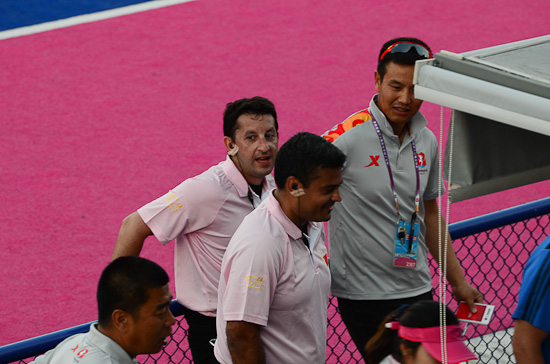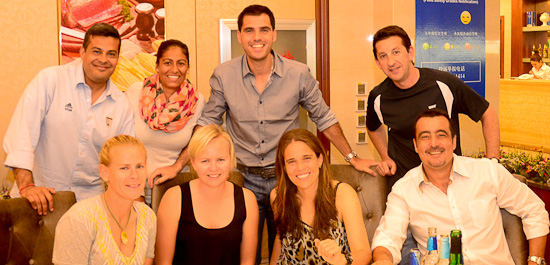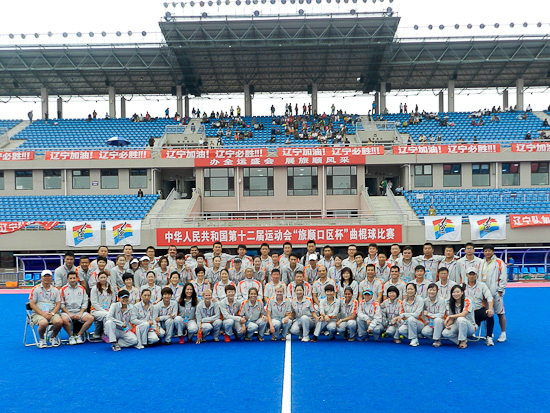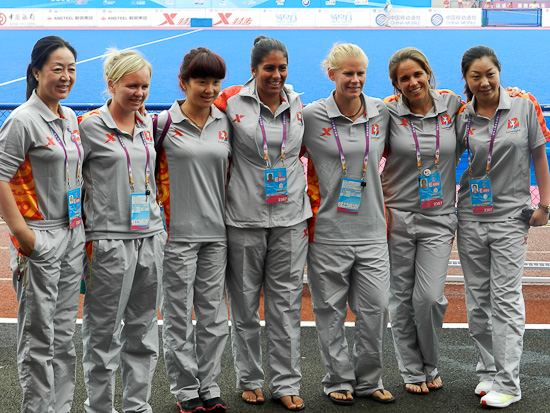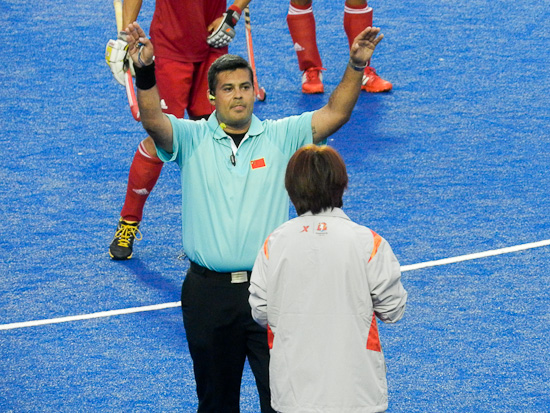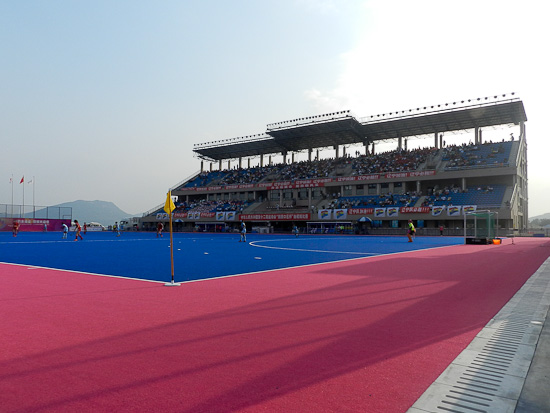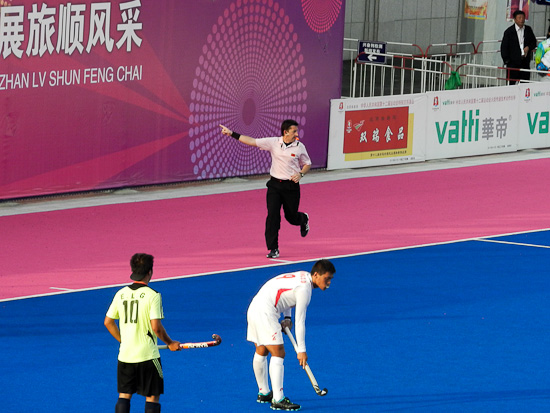
The Chinese National Games is a multi-sport, high level competition just like the Olympic Games, but only for China. They happen once every 4 years and most of the sports that take part in the Olympic Games make up the competition over a 2 week period. The games are hosted by one province with competitions spread throughout the many cities of the host province. Liaoning won the rights to host this year’s games.
The hockey facilities for this tournament were first class. Two brand new ‘smurf turfs’ were installed with a stadium to hold spectators. The backdrop of this venue also added to the atmosphere of this tournament. The turfs were located 20m from the ocean and were surrounded by a navy base. Every day people were treated to a beautiful view of good hockey and amazing scenery, all from the comfort of their seat in the stadium.
The format of the Chinese National games for both the men and women’s competition consisted of two pools of 4. The top two teams in each pool would play off against each other for a place in the coveted final of the Chinese National Games. Leading into this tournament Liaoning women were seen as favorites to take the title, having won the title for the two previous National Games and Liaoning were also seen as favorites for the men. The Chinese Hockey Association appointed approximately 70 officials to service this tournament, 8 of them being neutrals umpires who were appointed with the assistance of FIH. Similar to the men’s qualifying tournament earlier in the year the officials were over seen by FIH umpire Chen Dekang.
The closeness of both the men and women’s competition was highlighted on the women’s last day of pool play when a shootout was forced from the results of 2 different games. There were 5 possible different score lines for the two games that could potentially influence who went through to the semifinals from the women’s ‘pool of death.’ If all the stars aligned then two teams would be forced to participate in a shoot-out at the end of play for the day. As luck would have it, the stars aligned and Guangdong and Jilin were to return for the shoot-out. Guangdong won the shoot-out to secure their place in the semifinals.
The standard of hockey on show at this tournament was of such a high caliber that the concept of ‘mercy’ never came into play. For those unfamiliar with this concept, once a team has a score line of 10 goals against them the mercy rule is applied and the match is stopped.
As mentioned previously by Marcin Grochal and Dan Barstow whom attended the men’s qualifier for this tournament in May, the video umpiring system that is used by the Chinese Hockey Association is very sophisticated. The system that was used for the National Games was very similar to what was used for the qualifying tournament with only one difference; instead of using 4 cameras to assist with video referrals like the qualifiers, they had 6 cameras for the National games. The video referral system worked very well and the procedure of having a translator (Susan) on the sidelines to assist, meant that everything ran very smoothly. The participating teams used their referral skillfully and at crucial moments in the game. Credit needs to go to the Chinese Hockey Association for the way they have developed this system and the time and money they have put into it.
The video system was also used as a development tool for the officials that attended this tournament. Clips were collected throughout the day’s games and everyone would meet each evening to look at situations more in depth. Many aspects were discussed, including positioning, body language, decision-making, accident vs. deliberate and consistency. This was a very helpful tool for us to have as the clips created a very clear discussion point. What we lacked in understanding of language, whether it was Chinese or English was made up for with the universal language of hockey.
The Chinese Hockey Association are exceptional hosts. We were assigned 3 liaisons and a translator to assist us throughout our stay in China, Chi, Luis, Lulu and Susan. Their input and assistance was greatly appreciated throughout this tournament. They developed our knowledge of the Chinese language and culture and we educated them on a common language used at hockey tournaments, Spanglish. It is pleasing to say that all 4 are now almost fluent in it.
As part of the culture of the tournament a formal dinner was arranged the night before the tournament rest day. This featured a dinner for all the hockey officials including umpires, technical officials and judges. Dinner was followed by an evening of unique entertainment. The entertainment consisted of challenges between the Chinese officials and ‘the rest’- meaning US! Challenges ranged from team building activities to tests around the Chinese language. Our many skills and attributes were put on display for everyone, including our singing and dancing abilities-or lack thereof.
We were lucky enough to experience many different aspects of China and their culture. An interesting fact to note about the Liaoning region is that it is an important area in terms of military forces and in order to reduce the risk of foreign countries encroaching on their military strong hold foreign people were not allowed to come to this area of China. This regulation was only dropped 5 years ago and meant that as foreigners we were a unique sight for many locals.
The eight of us (*) chosen to represent the FIH and the Chinese Hockey Association for this prestigious event are all very thankful for the opportunity. We hope that we were able to present a high level of decision-making, leadership, and teamwork on and off the pitch. We would like to thank the Chinese Hockey Association for inviting us and being such exceptional hosts and the participating provinces for being so receptive to our involvement in this tournament, especially as we lacked the ability speak Chinese; thankfully body language speaks a million words.
(*) German Montes De Oca (Argentina), Fernando Gomez (Argentina), Daniel Lopez (Uruguay), Francessco Parisi (Italy), Carolina De La Fuente (Argentina) Stephanie Judefind (USA), Aleesha Unka (New Zealand) and Amber Church (New Zealand)
